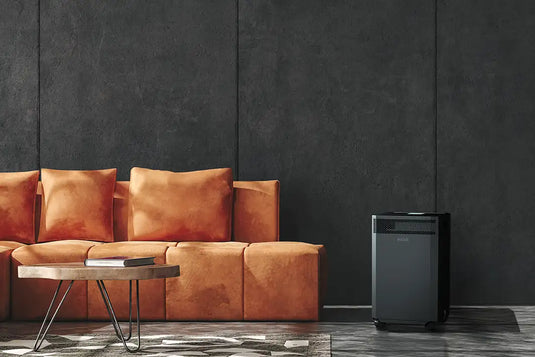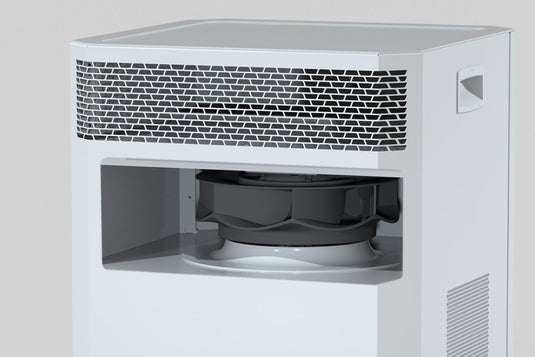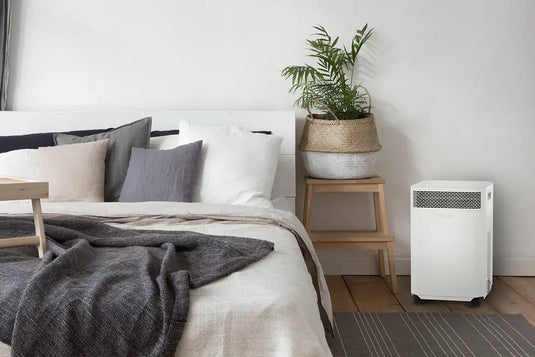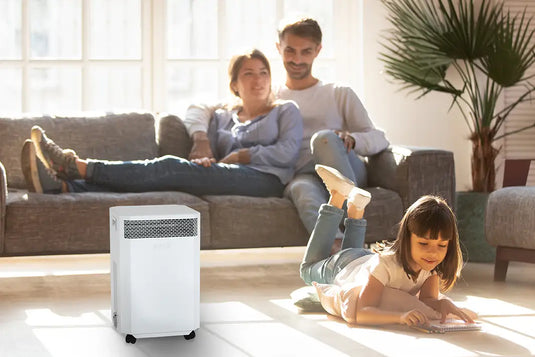Air Purifier Buyers Guide. What to look for when choosing an Air Purifier.
When it comes to choosing an air purifier for your home or business there are several important questions that need to be considered.

What do you need to filter from the air?
Knowing what needs to be filtered from the air is crucial when selecting an air purifier, as different air purifiers are designed to remove specific pollutants. Air pollution can take various forms, such as particulate matter, volatile organic compounds (VOCs), ozone, and biological contaminants. The type of air purifier you choose will depend on the specific pollutants you want to remove from your indoor air.
Particulate matter such as dust, pollen, and pet dander can cause respiratory problems and trigger allergies. An air purifier with a HEPA (High-Efficiency Particulate Air) filter can effectively remove these pollutants.
Biological contaminants, such as mold, bacteria, and viruses, can cause various health problems, including respiratory infections and allergies. To capture these contaminants, it is important to choose an air purifier with a medical-grade H13 HEPA filter.
VOCs, such as formaldehyde and benzene, are emitted from building materials, household products, and furniture. Smoke and road pollution can also cause a range of health problems, including headaches, nausea, and respiratory irritation. An air purifier with a high-capacity carbon filter can effectively remove these toxic chemicals from the air.
How large is the space that you need the air purifier to operate in?
The size of the room where the air purifier will be operating is an important consideration when choosing an air purifier because it affects the purifier's ability to clean the air effectively. An air purifier's performance is measured in terms of its airflow rate, which is the amount of clean air produced by the unit in cubic meters per minute.
If the air purifier is too small for the room, it will not be able to circulate the air fast enough to remove pollutants. As a result, the room's air quality will not improve, and the unit will run continuously, consuming more energy.
To determine the appropriate size of the air purifier, it's essential to consider the room's square meterage and the level of air pollution. A room with a high level of air pollution, such as a kitchen or a bathroom, will require a more powerful air purifier than a less polluted room, such as a bedroom.


What are the running costs of the air purifier?
The running costs of an air purifier are an important consideration when choosing one because they can add up over time and impact your budget. An air purifier needs to run continuously to keep the air clean, and its running costs consist of electricity consumption and filter replacement costs.
Electricity consumption is a significant factor when choosing an air purifier, as it can add up to a significant amount over time, especially if you run the unit continuously. Choosing an energy-efficient air purifier that consumes minimal power while providing optimal performance is essential. Some air purifiers come with features such as variable speed control and sleep modes, which can help reduce electricity consumption.
Filter replacement costs are another significant factor to consider when choosing an air purifier. The frequency of filter replacements depends on the air purifier type and the air pollution level in the room. All INOVA air purifiers feature a Tecnostat prefilter, which extends the life of the main HEPA filter. This results in HEPA filters that, depending on the environment, will only need to be changed every 3-5 years.
What is the operating noise level?
The operating noise level of an air purifier is an important consideration when choosing one because it affects the unit's ability to provide a comfortable indoor environment. Air purifiers can produce a significant amount of noise when operating, and the noise level can impact sleep, work, and overall quality of life.
Some background noise accompanies any appliance that deals with moving air, but ideally, it should produce only the sound of a soft breeze, as opposed to the noisy hum of the motor within. As an appliance that will spend much time in the room with you, it is essential to consider the background noise it will create during its many years of use. Air purifiers made from plastic are prone to vibration and motor noise due to the low-strength characteristics of the material.
We go to great lengths to make quiet air purifiers. We start by using all-steel construction, the highest-quality German-made motors, and encasing the motor in an isolated chamber with anti-vibration mounts from the body of the air purifier. This results in quiet operation, a smooth transition in airflow noise from low to high speeds, and, most importantly, no motor hum.


What material is the air purifier manfactured from?
When it comes to choosing an air purifier, the material of the unit is an important consideration. Two common materials used in air purifiers are plastic and powder-coated steel. All INOVA air purifiers are manufactured from powder-coated steel, but why is an air purifier made of powder-coated steel a better choice than one made of plastic?
Durability: One of the most significant advantages of powder-coated aluminum air purifiers is their durability. Unlike plastic air purifiers, which can crack or become brittle over time, powder-coated aluminum air purifiers are designed to last. This makes them a better choice for people who want a long-lasting and reliable air purifier.
Quality: Powder-coated aluminum air purifiers are typically of higher quality than plastic air purifiers. Steel is a more robust material, which means that it can better withstand wear and tear and is less likely to break or malfunction over time.
Maintenance: Steel air purifiers are also easier to maintain than plastic ones. Steel is a more hygienic material, making it less likely to harbor bacteria and other germs. Also, steel air purifiers are easy to clean, making them a great choice for people who want an air purifier that is easy to keep in good condition.
What warranty does the air purifier come with?
The warranty of an air purifier is an important consideration when choosing one because it protects you against potential defects and malfunctions. A warranty is a guarantee from the manufacturer that the unit will perform as advertised for a specified period. If a defect or malfunction occurs, the manufacturer will repair or replace the unit at no cost to you.
The warranty length is an essential factor to consider when choosing an air purifier. A longer warranty period provides more protection and peace of mind, ensuring that you are covered against defects and malfunctions for an extended period. A short warranty period may indicate that the manufacturer has limited confidence in the quality of the product, and you may end up paying for repairs or replacements out of pocket.
Most consumer-grade brands will only offer you a 12-month warranty. At INOVA, we proudly offer a 5-year warranty on our air purifier systems, confident that we are providing a product that will operate for years to come, giving you the peace of mind that you have made a wise investment in your health and well-being.

